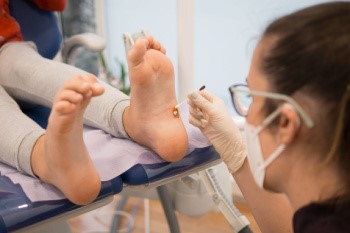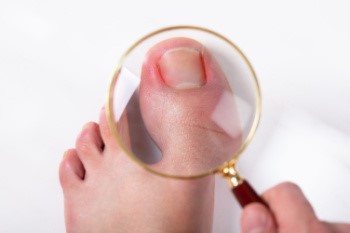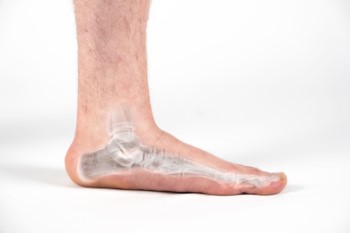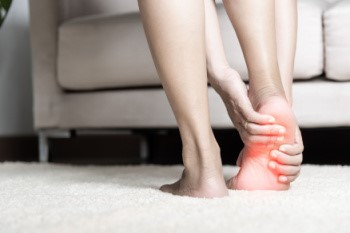Connect With Us
Blog
Items filtered by date: October 2024
Causes of Heel Pain
Heel pain is a common issue, often caused by various conditions, including plantar fasciitis, Achilles tendonitis, heel spurs, and bursitis. Plantar fasciitis, one of the most frequent causes, results in stabbing pain due to inflammation in the plantar fascia, a thick band of tissue connecting the heel to the toes. Pain is often felt first thing in the morning or after periods of inactivity. Achilles tendinitis occurs from overuse or strain on the Achilles tendon, causing pain at the back of the heel. Heel spurs are calcium deposits that develop over time and can lead to sharp pain with movement. Bursitis is inflammation of the bursa, small fluid-filled sacs that cushion bones, which can cause tenderness and discomfort in the heel. Treatment for heel pain depends on the cause but may include wearing supportive footwear or medical intervention like injections. If you have persistent heel pain, it is suggested that you schedule an appointment with a podiatrist for a proper diagnosis and treatment.
Many people suffer from bouts of heel pain. For more information, contact The Footcare Centre. Our podiatrists can provide the care you need to keep you pain-free and on your feet.
Causes of Heel Pain
Heel pain is often associated with plantar fasciitis. The plantar fascia is a band of tissues that extends along the bottom of the foot. A rip or tear in this ligament can cause inflammation of the tissue.
Achilles tendonitis is another cause of heel pain. Inflammation of the Achilles tendon will cause pain from fractures and muscle tearing. Lack of flexibility is also another symptom.
Heel spurs are another cause of pain. When the tissues of the plantar fascia undergo a great deal of stress, it can lead to ligament separation from the heel bone, causing heel spurs.
Why Might Heel Pain Occur?
- Wearing ill-fitting shoes
- Wearing non-supportive shoes
- Weight change
- Excessive running
Treatments
Heel pain should be treated as soon as possible for immediate results. Keeping your feet in a stress-free environment will help. If you suffer from Achilles tendonitis or plantar fasciitis, applying ice will reduce the swelling. Stretching before an exercise like running will help the muscles. Using all these tips will help make heel pain a condition of the past.
If you have any questions please feel free to contact our offices located in Weybridge, UK. We offer the newest diagnostic and treatment technologies for all your foot and ankle needs.
The Importance of Treating Gout
 Gout is a type of inflammatory arthritis that often affects the feet and ankles, causing intense pain and swelling. It occurs when uric acid crystals build up in the joints, typically starting with a sudden, severe flare in the big toe. Symptoms include sharp, burning pain, redness, warmth, and stiffness in the affected joint. Flares can last from days to weeks, often becoming more frequent if not managed properly. Repeated gout attacks can lead to tophus formation, which are large, painful deposits of uric acid crystals in soft tissues. Bony erosion can also occur which can permanently damage the joints. Over time, this can develop into chronic arthritis, making movement difficult and painful. Treatment focuses on reducing inflammation with medications and lowering uric acid levels through lifestyle changes, with an emphasis on proper diet and hydration. If you have symptoms of gout, it is strongly suggested that you visit a podiatrist for a proper diagnosis and care.
Gout is a type of inflammatory arthritis that often affects the feet and ankles, causing intense pain and swelling. It occurs when uric acid crystals build up in the joints, typically starting with a sudden, severe flare in the big toe. Symptoms include sharp, burning pain, redness, warmth, and stiffness in the affected joint. Flares can last from days to weeks, often becoming more frequent if not managed properly. Repeated gout attacks can lead to tophus formation, which are large, painful deposits of uric acid crystals in soft tissues. Bony erosion can also occur which can permanently damage the joints. Over time, this can develop into chronic arthritis, making movement difficult and painful. Treatment focuses on reducing inflammation with medications and lowering uric acid levels through lifestyle changes, with an emphasis on proper diet and hydration. If you have symptoms of gout, it is strongly suggested that you visit a podiatrist for a proper diagnosis and care.
Gout is a foot condition that requires certain treatment and care. If you are seeking treatment, contact The Footcare Centre. Our podiatrists will treat your foot and ankle needs.
What Is Gout?
Gout is a type of arthritis caused by a buildup of uric acid in the bloodstream. It often develops in the foot, especially the big toe area, although it can manifest in other parts of the body as well. Gout can make walking and standing very painful and is especially common in diabetics and the obese.
People typically get gout because of a poor diet. Genetic predisposition is also a factor. The children of parents who have had gout frequently have a chance of developing it themselves.
Gout can easily be identified by redness and inflammation of the big toe and the surrounding areas of the foot. Other symptoms include extreme fatigue, joint pain, and running high fevers. Sometimes corticosteroid drugs can be prescribed to treat gout, but the best way to combat this disease is to get more exercise and eat a better diet.
If you have any questions please feel free to contact our offices located in Weybridge, UK. We offer the newest diagnostic and treatment technologies for all your foot and ankle needs.
Types and Symptoms of Plantar Warts
 Plantar warts are benign growths that develop on the soles of the feet due to an infection with the human papillomavirus, or HPV. These warts can appear as small, rough lesions and are often mistaken for calluses. There are various types of plantar warts, including common warts, which are usually painless, and mosaic warts, which cluster together in groups. Symptoms include discomfort or pain while walking, especially when pressure is applied to the wart. The warts may also have tiny black dots in the center, which are small blood vessels. Plantar warts are primarily caused by direct contact with the virus, often found in moist environments like swimming pools and locker rooms. Plantar warts can be painful and may cause difficulty in completing daily activities. If you have developed this condition, it is strongly suggested that you promptly contact a podiatrist who can offer you the correct treatment method.
Plantar warts are benign growths that develop on the soles of the feet due to an infection with the human papillomavirus, or HPV. These warts can appear as small, rough lesions and are often mistaken for calluses. There are various types of plantar warts, including common warts, which are usually painless, and mosaic warts, which cluster together in groups. Symptoms include discomfort or pain while walking, especially when pressure is applied to the wart. The warts may also have tiny black dots in the center, which are small blood vessels. Plantar warts are primarily caused by direct contact with the virus, often found in moist environments like swimming pools and locker rooms. Plantar warts can be painful and may cause difficulty in completing daily activities. If you have developed this condition, it is strongly suggested that you promptly contact a podiatrist who can offer you the correct treatment method.
Plantar warts can be very uncomfortable. If you need your feet checked, contact one of our clinicians from The Footcare Centre. Our podiatrists will assist you with all of your foot and ankle needs.
About Plantar Warts
Plantar warts are the result of HPV, or human papillomavirus, getting into open wounds on the feet. They are mostly found on the heels or balls of the feet.
While plantar warts are generally harmless, those experiencing excessive pain or those suffering from diabetes or a compromised immune system require immediate medical care. Plantar warts are easily diagnosed, usually through scraping off a bit of rough skin or by getting a biopsy.
Symptoms
- Lesions on the bottom of your feet, usually rough and grainy
- Hard or thick callused spots
- Wart seeds, which are small clotted blood vessels that look like little black spots
- Pain, discomfort, or tenderness of your feet when walking or standing
Treatment
- Freezing
- Electric tool removal
- Laser Treatment
- Topical Creams (prescription only)
- Over-the-counter medications
To help prevent developing plantar warts, avoid walking barefoot over abrasive surfaces that can cause cuts or wounds for HPV to get into. Avoiding direct contact with other warts, as well as not picking or rubbing existing warts, can help prevent the further spread of plantar warts. However, if you think you have developed plantar warts, speak to your podiatrist. He or she can diagnose the warts on your feet and recommend the appropriate treatment options.
If you have any questions please feel free to contact our offices located in Weybridge, UK. We offer the newest diagnostic and treatment technologies for all your foot and ankle needs.
Reminder: When Was the Last Time...?
Managing Ingrown Toenails
 Ingrown toenails occur when the edge of the toenail grows into the surrounding skin, causing pain and discomfort. This condition commonly affects the big toe and can result from improper nail trimming, wearing tight shoes, or genetic predisposition. Early symptoms include redness, swelling, and tenderness along the nail edges. If left untreated, ingrown toenails can lead to infection, abscesses, and chronic pain, which may complicate walking or lead to more severe health issues. Individuals with poor nail-cutting habits, wearing tight footwear, or certain foot deformities are at higher risk. Diagnosis typically involves a physical examination, during which a podiatrist will assess the nail and surrounding tissues. In some cases, an X-ray may be used to rule out other conditions. To address persistent ingrown toenails and prevent complications, it is suggested you schedule an appointment with a podiatrist for proper treatment and care.
Ingrown toenails occur when the edge of the toenail grows into the surrounding skin, causing pain and discomfort. This condition commonly affects the big toe and can result from improper nail trimming, wearing tight shoes, or genetic predisposition. Early symptoms include redness, swelling, and tenderness along the nail edges. If left untreated, ingrown toenails can lead to infection, abscesses, and chronic pain, which may complicate walking or lead to more severe health issues. Individuals with poor nail-cutting habits, wearing tight footwear, or certain foot deformities are at higher risk. Diagnosis typically involves a physical examination, during which a podiatrist will assess the nail and surrounding tissues. In some cases, an X-ray may be used to rule out other conditions. To address persistent ingrown toenails and prevent complications, it is suggested you schedule an appointment with a podiatrist for proper treatment and care.
Ingrown toenails can become painful if they are not treated properly. For more information about ingrown toenails, contact one of our clinicians from The Footcare Centre. Our podiatrists can provide the care you need to keep you pain-free and on your feet.
Ingrown Toenails
Ingrown toenails occur when a toenail grows sideways into the bed of the nail, causing pain, swelling, and possibly infection.
Causes
- Bacterial infections
- Improper nail cutting such as cutting it too short or not straight across
- Trauma to the toe, such as stubbing, which causes the nail to grow back irregularly
- Ill-fitting shoes that bunch the toes too close together
- Genetic predisposition
Prevention
Because ingrown toenails are not something found outside of shoe-wearing cultures, going barefoot as often as possible will decrease the likeliness of developing ingrown toenails. Wearing proper fitting shoes and using proper cutting techniques will also help decrease your risk of developing ingrown toenails.
Treatment
Ingrown toenails are a very treatable foot condition. In minor cases, soaking the affected area in salt or antibacterial soaps will not only help with the ingrown nail itself, but also help prevent any infections from occurring. In more severe cases, surgery is an option. In either case, speaking to your podiatrist about this condition will help you get a better understanding of specific treatment options that are right for you.
If you have any questions please feel free to contact our offices located in Weybridge, UK. We offer the newest diagnostic and treatment technologies for all your foot and ankle needs.
When to See a Podiatrist for Flat Feet
 Flat feet, also known as fallen arches, occur when the arches of the feet are lower than usual or completely flat, causing the entire sole of the foot to touch the ground when standing. While many people with flat feet experience no symptoms, others may develop pain, particularly in the feet, ankles, or lower legs. This condition can lead to overpronation, where the foot rolls inward excessively during walking or running, potentially causing alignment issues and stress on the knees and hips. If flat feet develop suddenly in adulthood, it may indicate an underlying issue such as a tendon injury or arthritis. If you have persistent pain and difficulty engaging in activities because of flat feet, it is suggested that you schedule an appointment with a podiatrist who can assess the severity, recommend treatments like orthotics, and guide you on managing symptoms to prevent complications and improve foot function.
Flat feet, also known as fallen arches, occur when the arches of the feet are lower than usual or completely flat, causing the entire sole of the foot to touch the ground when standing. While many people with flat feet experience no symptoms, others may develop pain, particularly in the feet, ankles, or lower legs. This condition can lead to overpronation, where the foot rolls inward excessively during walking or running, potentially causing alignment issues and stress on the knees and hips. If flat feet develop suddenly in adulthood, it may indicate an underlying issue such as a tendon injury or arthritis. If you have persistent pain and difficulty engaging in activities because of flat feet, it is suggested that you schedule an appointment with a podiatrist who can assess the severity, recommend treatments like orthotics, and guide you on managing symptoms to prevent complications and improve foot function.
Flatfoot is a condition many people suffer from. If you have flat feet, contact one of our clinicians from The Footcare Centre. Our podiatrists will treat your foot and ankle needs.
What Are Flat Feet?
Flatfoot is a condition in which the arch of the foot is depressed and the sole of the foot is almost completely in contact with the ground. About 20-30% of the population generally has flat feet because their arches never formed during growth.
Conditions & Problems:
Having flat feet makes it difficult to run or walk because of the stress placed on the ankles.
Alignment – The general alignment of your legs can be disrupted because the ankles move inward which can cause major discomfort.
Knees – If you have complications with your knees, flat feet can be a contributor to arthritis in that area.
Symptoms
- Pain around the heel or arch area
- Trouble standing on the tip-toe
- Swelling around the inside of the ankle
- Flat look to one or both feet
- Having your shoes feel uneven when worn
Treatment
If you are experiencing pain and stress on the foot you may weaken the posterior tibial tendon, which runs around the inside of the ankle.
If you have any questions please feel free to contact our offices located in Weybridge, UK. We offer the newest diagnostic and treatment technologies for all your foot and ankle needs.
Blog Archives
- March 2025
- February 2025
- January 2025
- December 2024
- November 2024
- October 2024
- September 2024
- August 2024
- July 2024
- June 2024
- May 2024
- April 2024
- March 2024
- February 2024
- January 2024
- December 2023
- November 2023
- October 2023
- September 2023
- August 2023
- July 2023
- June 2023
- May 2023
- April 2023
- March 2023
- February 2023
- January 2023
- December 2022
- November 2022
- October 2022
- September 2022
- August 2022
- July 2022
- June 2022
- May 2022
- April 2022
- March 2022
- February 2022
- January 2022
- December 2021
- November 2021
- October 2021
- September 2021
- August 2021
- July 2021
- June 2021
- May 2021
- April 2021
- February 2021
- January 2021
- December 2020
- November 2020
- October 2020


